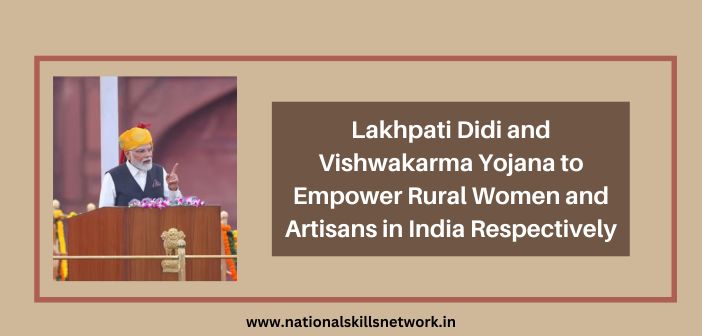Recently, the government of India has unveiled two visionary initiatives that hold immense promise for the empowerment and economic upliftment of marginalized and traditional population segments. These initiatives, namely the ‘Lakhpati Didi’ scheme and the ‘Vishwakarma Yojana,’ were launched by Prime Minister Narendra Modi on the occasion of Independence Day, August 15, 2023, reflecting the government’s commitment to fostering inclusive growth and leveraging India’s potential in various sectors.
‘Lakhpati Didi’ Scheme
The ‘Lakhpati Didi’ scheme, a visionary initiative unveiled by the Indian government, aims to revolutionize women’s empowerment in rural areas. This transformative program, highlighted by Prime Minister Narendra Modi during his recent Independence Day speech, seeks to equip women with essential skills to establish micro-enterprises within their villages. The scheme recognizes and builds upon the pivotal roles already held by women as ‘bank-wali didis,’ ‘Anganwadi didis,’ and ‘dawai-wali didis’ in rural communities. By offering training in various sectors, ranging from plumbing to innovative fields like LED bulb manufacturing and drone operation, the government aspires to foster sustainable income sources for women and their families. Notably, this initiative challenges gender norms, promotes equality, and envisions the creation of two crore ‘lakhpati didis’ or women entrepreneurs in rural India, which could significantly bolster local economies, generate employment opportunities, and reduce poverty. Through this scheme, women are poised to achieve financial independence, enabling more active participation in familial well-being and decision-making processes, heralding a new era of empowerment and economic progress in rural regions.

Vishwakarma Yojana for traditional artisans
The ‘Vishwakarma Yojana,’ a groundbreaking initiative announced by Prime Minister Narendra Modi in his recent Independence Day speech, holds the promise of uplifting traditional craftsmen and workers, particularly benefiting those from the Other Backward Classes (OBCs) in India. This scheme, will be launched on September 17 to coincide with Vishwakarma Jayanti, reflects the government’s commitment to revitalizing and supporting India’s rich heritage of traditional craftsmanship. With an initial outlay of Rs 13,000-15,000 crore, the scheme demonstrates a substantial financial commitment to empower this vital population segment.
Under the ‘Vishwakarma Yojana,’ artisans skilled in various traditional trades such as weaving, goldsmithing, blacksmithing, laundry, and barbering, along with their families, will be the beneficiaries. This recognition of their contributions to India’s cultural heritage and economy is commendable. Furthermore, the initiative aligns with Prime Minister Modi’s emphasis on skill development and harnessing India’s demographic dividend, acknowledging the valuable resource of youthful energy and skills within the country’s population. The scheme’s integration of traditional artisans into the MSME value chain augments their market reach. It enhances the quality and sustainability of their products. This concerted effort to uplift traditional artisans carries the potential to reshape India’s cultural landscape and contribute to its economic growth, underscoring the government’s commitment to nurturing talent and preserving heritage in a rapidly evolving world.
Also read: NEP 2020: Initiatives-in-progress to transform Education and Skill Development
Both schemes reflect a comprehensive approach to inclusive development, aiming to uplift marginalized women in rural areas and empower traditional artisans while fostering economic growth and sustainability.












